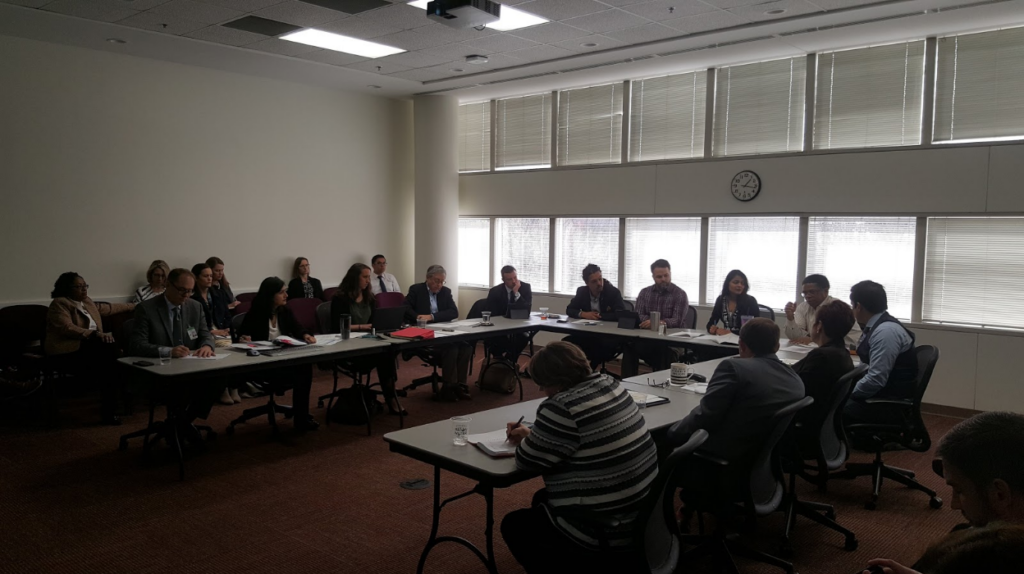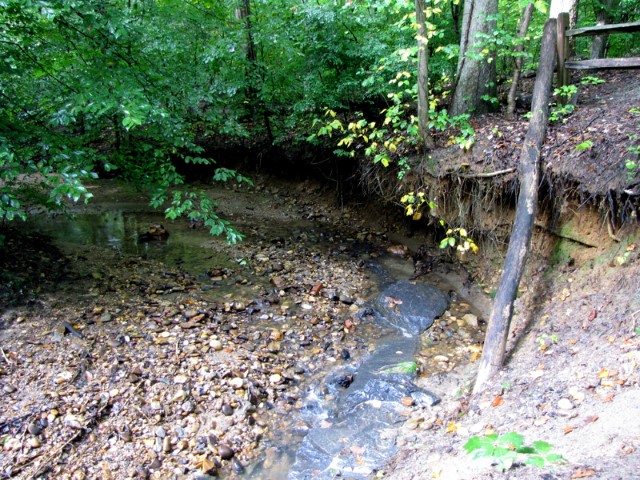City Council Environment Committee explores cost-share program to fund storm water repairs
The City Council Environment Committee discussed a potential cost-share program to fund certain storm water repairs as they face a growing backlog of projects and lack of revenue for Storm Water Services. The purpose of the Charlotte-Mecklenburg Stormwater Services is to effectively drain runoff from storms safely while ensuring runoff is as clean as possible when it reaches the streams.

Environment Committee members and staff discussed the backlog of storm water projects.
City staff brought forth to the Environment Committee a number of challenges they are facing:
- Aging drainage infrastructure requires more maintenance.
- Continued development is adding to amount of drainage system.
- Community expectations are greater than available resources.

Erosion on private property threatens the health of creeks and aquatic habitats.
A growing backlog of storm water needs
Staff stated there is insufficient revenue to keep up with incoming requests. There are currently over $1 billion in unfunded regular minor repair projects. The City Council has not increased storm water fees over the last two years. With no increase in revenue, the backlog of repairs will continue to grow, as will the time it takes to complete these projects.
Storm Water Services’ regular minor repair list includes a wide range of projects, from repairing failing drainage infrastructure and sinkholes to addressing flooding and erosion. Projects are funded and repaired in order of severity under 4 classifications: Ai, A, B, C.
C requests are the lowest priority as they typically do not pose a major hazard, often fall on private property, and typically do not affect many people. C requests make up the bulk of the repairs list both in terms of the numbers of requests and the overall cost. Since the other requests take priority, C requests can take around 20 years to be fixed.
In 2015, Storm Water services stopped qualifying C requests. There are still around 4,000 outstanding C requests, and not all of them would necessarily still qualify as a C today. For context, the city reevaluated 400 C requests in 2016 and found that 50% no longer needed any repairs, 20% reclassified to A or B status, and 30% remaining with the C classification. About 36 calls from the public regarding C requests have been made to Storm Water Services over the last 2 years.
A new proposed approach
At the meeting, Staff recommended to remove C requests from the regular minor repair list, and create a pilot cost-share program to address the outstanding requests. The cost-share program would be funded at $5 million over 5 years based on a prospective 8% storm water fee increase. This would be enough to fund around 50 C requests.
Only those property owners who have outstanding C requests would potentially qualify. They would be be subject to revaluation to determine whether their request still met the C-level criteria. If so, they would qualify for the cost-share program which would involve the city sharing the cost of repairs with the property owner. The exact split was not finalized but staff floated the idea that the city would pay for 80-90% of the repair cost with the property owner paying the remainder. As part of the process, property owners would have to donate the affected area to the city as an easement allowing the city to maintain it as needed. City staff hope to initiate the program in January 2019 and start projects as funding and resources allow.
City Staff hope this process will significantly decrease the number of projects and overall cost of the regular minor repair list. This, however, would not address the need for Storm Water services to increase revenue to address higher priority Ai, A, and B projects. Committee members discussed referring a potential fee increase to the Budget Committee.
While no formal votes were taken at the meeting, committee members did ask city staff for additional details about the cost-share program before they send the request to the full council.
The Environment Committee meets on the first Monday of each month. You can check the committee website and calendar here for updates.
March 5, 2018 Environment Committee Agenda and Handouts.
City Council members in attendance:
- Dimple Ajmera, at-large representative, committee chair, Environment Committee
- Larken Egleston, district 1 representative, vice chair, Environment Committee
- Matt Newton, district 5 representative, Environment Committee
- Gregory A. Phipps, district 4 representative, Environment Committee
- Braxton Winston, at-large representative, Environment Committee
- Tariq Bokhari, district 6 representative
- Edmund H. Driggs, district 7 representative
Thanks for reading!
As a nonprofit, community support is essential for us to keep doing what we do — including providing free articles like this. If you found this article helpful, please consider supporting Sustain Charlotte.
Want to stay in the loop? Subscribe to our weekly newsletter and follow us on Instagram, Facebook, and Twitter.
